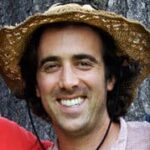For the past ten years, Adamah has provided powerful learning experiences that have transformed the lives of more than 300 young Jews. Adamah is, in its focus and its impact, small-scale and intense: a small leadership training program that invests three months in the lives of 12-15 young adults at a time. We are not a yeshiva, university, or certified training program for a specialized field, though our Adamahniks learn much that one might learn at a yeshiva, a university, or a farm. Adamah is a time for learning, connection, and reflection. (Our field has been flooded twice in the last three years: so what does it mean to beat willow branches against the earth as part of a bring-on-the-rains Hoshanah Rabah ritual?). Their souls filled up, our alumni go off in 18 different directions to sow the seeds of their experience. Click here to learn more about what Adamah alumni are up to.
We, the Adamah staff, are also fed by the work we do in the fields, in the hearts and minds around us, and in the ever-widening circle of our community. We believe in the ecological, educational, and religious import of our work. Up to this point, we have not offered credentials or published a book about Adamah. We do not do the work for personal gain, but it is a sweet gift when we receive credit from the larger world.
This winter, Adamah received public recognition in two significant ways: the potent combination of Jewish learning and ritual at Adamah can now count for college credit, and the first formal research on the impact of Adamah, and other programs within the field, was published.
In the fall of 2011, writer, farmer and Christian eco-theologian Fred Bahnson spent a week with Adamah and the Sukkahfest community at Isabella Freedman. Fred dove into Adamah, joining us for Hebrew chanting at dawn, milking goats, chopping carrots for kim chi, and Shabbat prayers. He wrote a lovely chapter about Adamah in his acclaimed book, Soil and Sacrament: Four Seasons Among the Keepers of the Earth (Free Press, 2013). Fred also connected us to his colleagues at Wake Forest Divinity School where he directs the new Food, Faith, and Religious Leadership Initiative. WFU is the only divinity school in the country with a program focused on food and faith. Their mission is to equip religious leaders with the knowledge and skills to “create more redemptive food systems, where God’s voice becomes visible for a hungry world.” Sound like a good partner for Adamah and Hazon? We thought so.
Our collaboration involves accreditation for the Adamah Fellowship (3 graduate credits) and a joint course for Wake Forest Divinity students to be held at Isabella Freedman this spring. Eight divinity school students will join the Adamah and Hazon community for work in the fields, Shabbat prayers, our famous ‘First Fruits Parade,’ and all the learning and celebration of our ‘See the Sounds’ Shavuot retreat. We are thrilled for the chance to share across the widening boundaries of religious faith and practice.
The other fruit of our hard work and patience is the JOFEE report that was released this March. JOFEE stands for Jewish Outdoor, Food & Environmental Education, and represents the larger field in which Adamah is situated. These three new disciplines – Jewish outdoor education; Jewish food education; and Jewish environmental education – have grown sharply in the last dozen years. In a strong confirmation of our own anecdotal data, the researchers found that immersive programs like the Adamah Fellowship have helped many young people reconnect and reengage with Judaism, build their leadership potential, and increased participants’ sense of hope for the future of the Jewish people. Check out the full report here.
A fellow farmer mentioned to me that it took 10 years before he enjoyed a real harvest from his apple trees. Some things take time. So, this spring, as we sow seeds and sit at the seder table, the Adamah community will celebrate good work performed without thought of recognition, patience, and the self-renewing hope that we can share with the world. And if you would like to participate in Adamah – or have a friend or relative whom you think would enjoy it – put them in touch.
Finally: this coming year, starting at Rosh Hashanah, is the shmita year, the sabbatical year in Jewish life. It’s a time for reflection, for looking back and looking forwards. We’ll spend some of our time at Adamah doing ecological restoration work; and as a leadership team, we’ll use the year to look back and to look forwards, reflecting on what we’ve learned and brainstorming about the next seven years to come. If you are interested in Adamah, if you have ideas or suggestions, then please don’t hesitate to be in touch.
